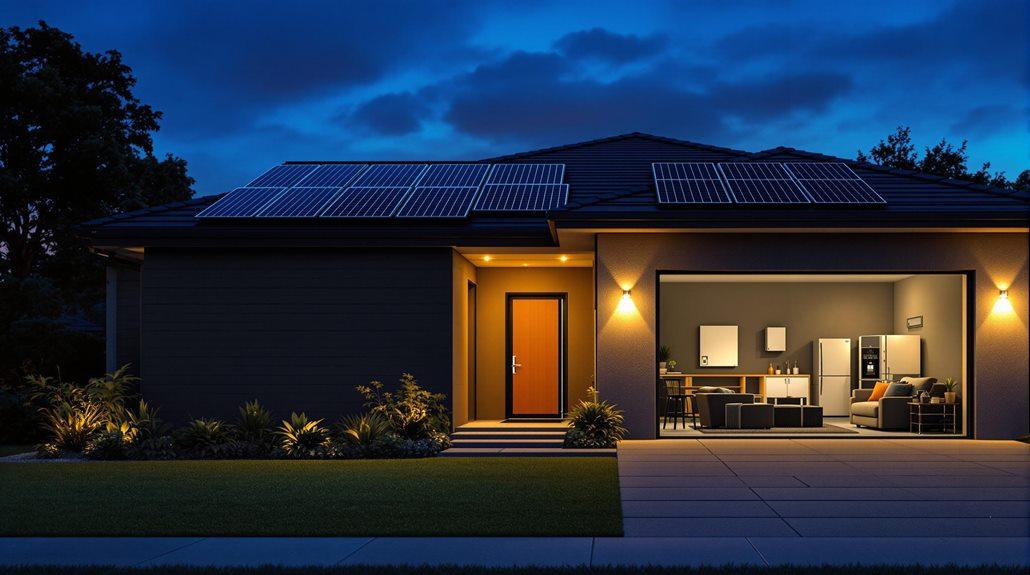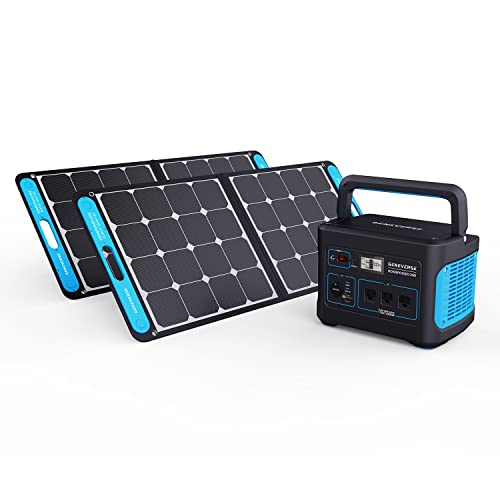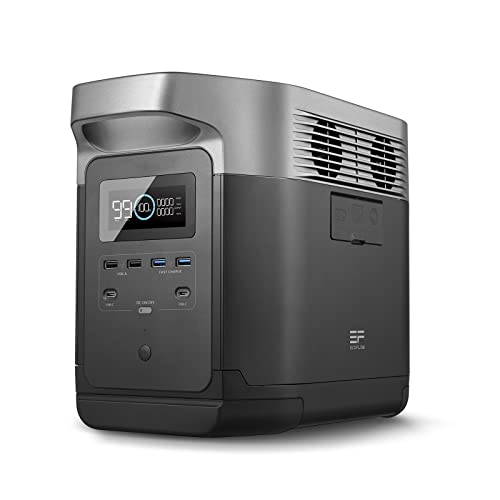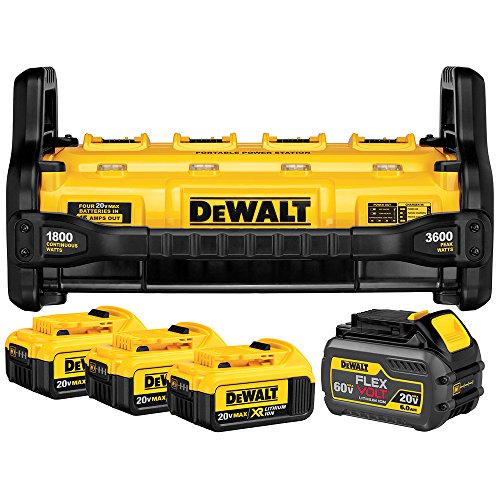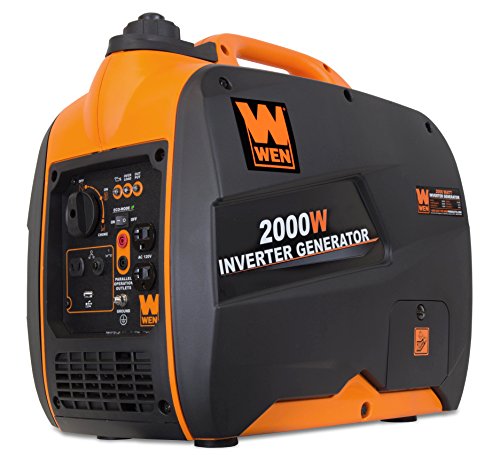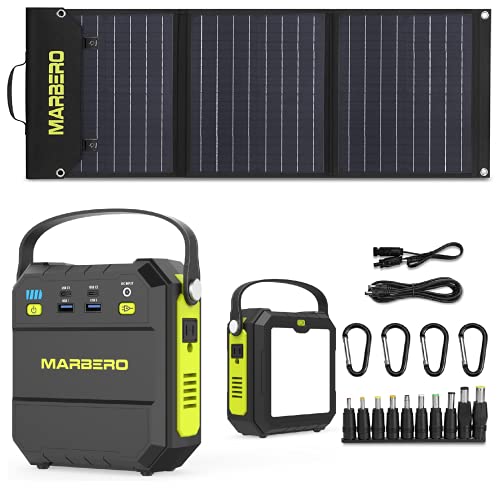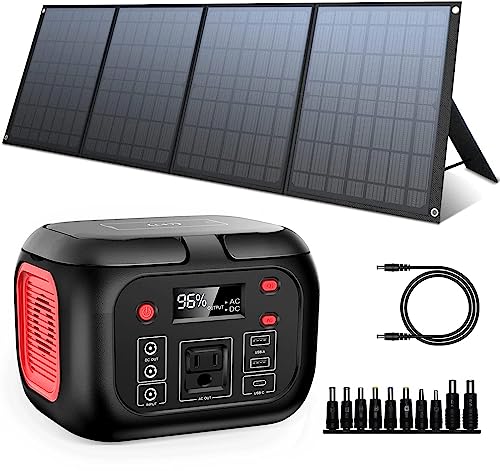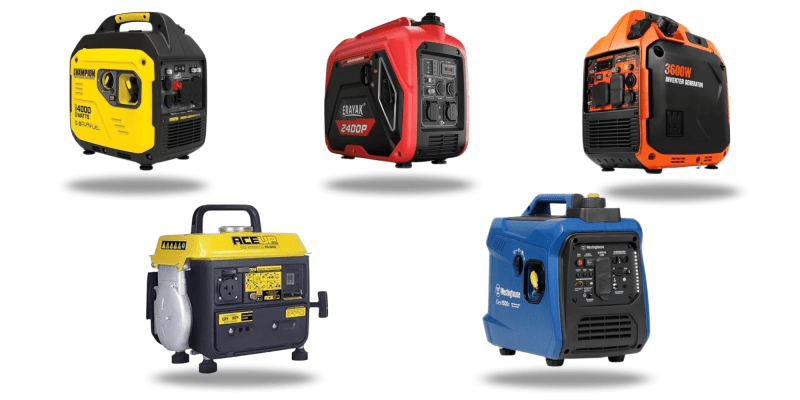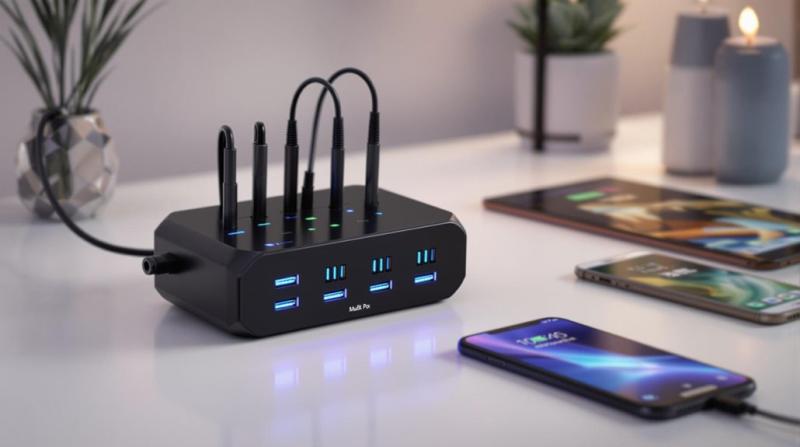When choosing a home power backup system, you'll need to decide between two main options: battery systems ($10,000-$20,000) or generators ($7,000-$15,000). Battery systems offer quiet, maintenance-free operation with 13.5 kilowatt-hours typical capacity and 10-15 year warranties, while generators provide continuous power for up to three weeks. For most homes, you'll need 5,000-7,500 watts of emergency power capacity to run essential circuits. Both systems require professional installation by a licensed electrician and include features like automatic switchover and mobile monitoring capabilities. understanding your specific power needs and budget will help determine which backup solution best protects your home during outages.
Key Takeaways
- Battery systems provide 13.5 kilowatt-hours of typical capacity with quiet operation and 10-15 year warranty for $10,000-$20,000.
- Generator systems offer continuous power for up to three weeks at a lower cost range of $7,000-$15,000.
- Average homes require 5,000-7,500 watts during emergencies, while smaller homes need 3,000-5,000 watts for essential backup power.
- Professional installation by a licensed electrician is mandatory, with costs ranging from $500-$3,000 including necessary transfer switch.
- Systems feature mobile monitoring, real-time tracking, and smart energy management for optimal power distribution during emergencies.
Portable Power Station Categories
Portable power stations come in distinct categories to match your specific backup power needs. You'll find compact systems starting at 300Wh, like the BougeRV Flash300, which works well for basic emergency backup power, while larger 6,000W systems like the Anker Solix F3800 can handle more demanding energy requirements. Advanced lithium batteries offer superior cycle life of 500-2000 charges, making them a reliable long-term investment.
For mid-range backup power, you'll want to evaluate systems like the Jackery Explorer 1000 Plus, offering 1,264Wh capacity and 2,000W output. These generators can be expanded with additional battery packs, making them versatile for varying power demands. If you're looking for maximum capacity and RV compatibility, the Jackery Explorer 2000 Plus delivers robust performance with its 25A AC output.
Budget-conscious homeowners can opt for efficient systems like the Bluetti AC70, which provides 768Wh capacity at $429. All these portable power stations use advanced lithium iron phosphate battery technology, ensuring longer lifespan and reliable performance across temperature variations. When choosing your backup system, consider pairing it with solar panels for sustainable energy generation during extended power outages.
Battery Vs Generator Solutions
When choosing between battery backup systems and traditional generators, you'll need to weigh significant tradeoffs in relation to cost, runtime, and maintenance requirements. While home battery backup solutions like the Tesla Powerwall require a higher initial investment of $10,000-$20,000, they'll save you money over time through reduced operational costs and minimal maintenance needs. For peak performance, systems should include pure sine wave inverters to deliver clean, consistent power to sensitive home electronics.
Your decision should primarily depend on your specific power outage concerns and electrical system requirements. Battery backup systems offer quieter operation, easier installation, and seamless integration with essential circuits, but they're limited by battery capacity. You can expect about 13.5 kilowatt-hours from a typical system, which may not sustain extended outages. Traditional generators, connected through a transfer switch, can provide continuous backup power for up to three weeks, making them ideal for longer grid power disruptions.
Consider your local climate conditions and typical outage patterns when selecting between these backup power solutions. Battery systems come with longer warranties and maintain 70% capacity for about 10 years, while generators need more frequent servicing but offer reliable portable power stations for extended emergencies. Your choice should align with your home's energy consumption and budget constraints.
Home Power Requirements
Understanding your home's power requirements is essential before investing in any backup power solution. When you're planning to protect your home from power grid failures, you'll need to calculate the total power output needed to run your essential appliances and critical circuits during an outage. Lithium battery systems offer superior performance with faster charging times and deeper discharge capabilities than traditional options.
The average home typically requires between 5,000 and 7,500 watts to maintain basic operations during emergencies. Your specific energy needs will depend on several factors, including your home's size and which appliances you consider essential. A refrigerator alone can draw 700-1,200 watts, while other critical circuits for lighting, medical equipment, and communication devices add to your total requirements.
To accurately determine your backup power needs, consider scheduling a professional energy audit. This assessment will help you identify which circuits you'll want to transfer to your battery storage or generators during an outage. Smaller homes might function well with 3,000-5,000 watts of backup power, while larger residences could require 10,000-15,000 watts. Most backup power systems can support 4-10 home circuits, and you can expand your capacity with modular solutions as needed.
4.34 out of 5 starsGeneverse 1002Wh (1x2) Solar Generator Bundle: 1X HomePower ONE Portable Power Station (3X 1000W AC Outlets) + 2X 100W Solar Panels. Quiet, Indoor-Safe Backup Battery Power Generator For Home Devices
and Outdoor Adventures
Product information
Product Review Score
Product links
Installation and Setup Procedures
After determining your home's power requirements, proper installation of your backup power system becomes the next key step. Your system's battery management protection capabilities are essential for preventing damage from power surges and overheating during operation. You'll need to hire a licensed electrician to verify professional installation that meets all safety compliance standards, regardless of whether you choose a battery backup or generator system.
A critical component of your installation is the electrical transfer switch, which safely manages the shift between utility and backup power sources. For battery backup systems, you'll have flexible mounting options on walls or floors near your electrical panel, making them adaptable to various spaces. Generator systems, however, require a concrete foundation and proper planning for fuel connections and ventilation.
Your installation costs will typically range from $500 to $3,000, depending on your system's complexity. Whole-home solutions require more extensive modifications to your electrical panel and may incur higher professional fees. If you're considering solar integration with your battery backup, you'll need strategic placement to optimize connectivity. Remember, attempting DIY installation isn't just unsafe—it's typically prohibited by code requirements. The investment in professional installation confirms your system will function reliably when you need it most.
Cost Analysis and Maintenance
The financial investment in a home backup power system varies substantially between battery and generator solutions. While you'll initially spend more on a battery solution, ranging from $10,000 to $20,000, you'll find significant savings in operational expenses over time. Battery cycle life is particularly important when evaluating long-term value, with lithium-ion systems offering superior longevity compared to other options. The integrated home power supply system requires professional installation to connect with your home circuits, but it'll need minimal maintenance once it's up and running.
When comparing maintenance requirements, backup batteries have a clear advantage over generators. You won't need to worry about fuel systems or regular mechanical servicing with a battery setup, and most systems come with extensive warranties covering capacity rating for 10-15 years. If you need more power, you can add expansion batteries without significant modifications to your existing setup. Generator systems, while less expensive upfront at $7,000-$15,000, require ongoing maintenance checks and component replacements that increase their lifetime costs.
Consider the total cost of ownership when making your decision. Battery systems typically prove more economical in the long run due to their reduced maintenance needs, absence of fuel costs, and longer-lasting components.
SGD 759.20
4.19 out of 5 starsECOFLOW DELTA 1300 Solar Generator
The Ultimate Solution for Off-Grid Power and Emergencies
Product information
Product Review Score
Product links
Performance and Technical Specifications
When selecting a home backup power system, you'll need to match your power requirements with the right technical specifications. Modern backup power solutions offer capacities ranging from 1,500Wh to 20,000Wh, enabling you to power multiple circuits during outages. The power output capabilities typically range between 7.2-21.6kW, supporting both 120V and 240V electrical systems in your home.
Today's battery systems feature sophisticated auto-switchover technology that activates within 10 milliseconds, ensuring your essential appliances continue running without interruption. Whether you're considering portable generators or whole-home backup solutions, you'll find options capable of supporting 4-12 electrical circuits during emergencies. The technical specifications of these systems now include smart energy management features that help you monitor and control your power usage effectively.
You can track your system's performance through mobile apps, which provide real-time data on energy consumption and weather conditions. These advanced monitoring capabilities allow you to optimize your home backup power system's efficiency, ensuring reliable performance when you need it most. The integration of smart technologies has transformed these systems into all-encompassing power management solutions for modern homes.
Frequently Asked Questions
What Is the Best Power Source During a Power Outage?
The best power source during an outage depends on your specific needs. You'll want to evaluate backup generators for extended blackouts, while home batteries with solar panels work well for shorter interruptions. Power stations and battery banks offer portable solutions, and inverter systems can help manage your energy efficiently. For total coverage, you might combine multiple solutions like emergency cells and resilient supplies to guarantee you're never left in the dark.
What Is the Alternative to a Generator for a Power Outage?
You've got several reliable alternatives to generators during power outages. Home batteries, like the Tesla Powerwall, coupled with solar panels offer a sustainable solution. You can also consider portable power banks and backup batteries for smaller needs. Battery storage systems with inverters provide clean, quiet energy while wind turbines serve as another renewable option. These alternative sources often come with smart features and can seamlessly power your essential appliances.
How to Power Your Home Through an Outage Without a Gas Generator?
When darkness falls during an outage, you don't need to be left in the dark. You can power your home using alternative sources like home batteries and solar panels. Install backup systems like Tesla Powerwall or similar power stations that store electric energy. Combine these with solar generators, battery banks, or even wind turbines for sustainable power. You'll also find portable inverters handy for smaller devices, giving you reliable power without the noise and fumes of gas generators.
What Is the Best Option for Power Backup?
Your best power backup strategy depends on your specific household needs and critical infrastructure requirements. For energy independence and home safety, you'll want to assess your outage management priorities. If you're seeking renewable alternatives, a battery system like Tesla Powerwall offers electrical resilience with smart features. If you need extended power solutions, a generator provides longer runtime. Consider your budget, essential appliances, and system design to determine the most effective backup solution.
